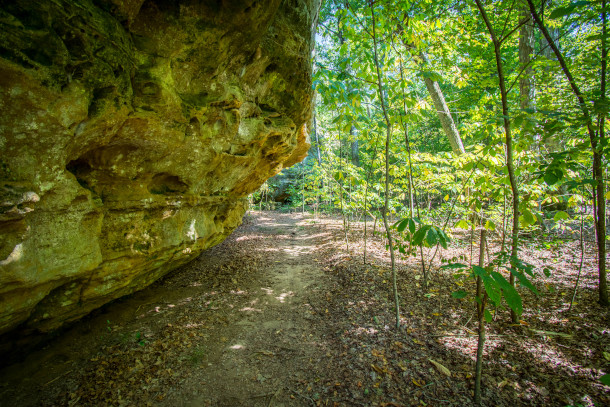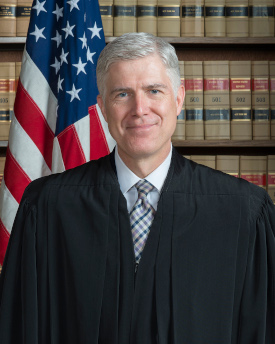A Win for Native American Sovereignty
Air Date: Week of September 25, 2020

A path located in the Mantle Rock Preservation, where Cherokee would’ve walked on the 800-mile forced exodus from the Southeastern United States to Oklahoma. (Photo: Don Sniegowski, Flickr, CC-By-NC-SA-2.0)
A recent Supreme Court ruling recognized Native Americans sovereignty over millions of acres of tribal lands in Oklahoma. Rebecca Nagle is a member of Cherokee Nation and host of the podcast “This Land”, which tracks the pair of cases that led to the Supreme Court ruling. She joins Living on Earth's Jenni Doering to talk about what this ruling means after decades of ignored rights of Native American tribal members living in Oklahoma and the implications for Indian country as a whole.
Transcript
BASCOMB: It’s Living on Earth, I’m Bobby Bascomb.
DOERING: And I’m Jenni Doering.
A recent Supreme court ruling gives Native Americans in Oklahoma renewed sovereignty over their tribal lands, an area of roughly 19 million acres. The land in question marked the end of the Trail of Tears for the five tribes that underwent that forced relocation in the mid-1800s: the Cherokee, Chickasaw, Choctaw, Seminole, and Muscogee Creek. They built a new life in Eastern Oklahoma, only to have their land stripped away, bit by bit, over the next century and a half. Now in an historic 5-4 decision for which Justice Neil Gorsuch wrote the majority opinion, the Supreme Court reaffirms that the boundaries of Muscogee Creek Nation still exist. So the tribe, not the state of Oklahoma, holds some key jurisdictional powers. Rebecca Nagle is a member of Cherokee Nation and host of the podcast 'This Land”, which tracks the pair of cases that led to the Supreme Court ruling. She joins us now from, Oklahoma. Rebecca, welcome to living on Earth!
NAGLE: Thanks so much for having me.
DOERING: Rebecca, could you please take us to the land in Eastern Oklahoma that you're talking about? What is it like there? And how does the day in the life of someone who lives within the Muscogee reservation compared to someone who doesn't?
NAGLE: Yeah, so, um, you know, people call eastern Oklahoma here, green country, I think a lot of people think about like planes and tumbleweeds, which does happen in western Oklahoma. But here in eastern Oklahoma, we're at the very tip of the Ozarks so there's a lot of hills, a lot of rivers, especially in the spring and summertime, it's very green and beautiful. What is happening as a result of this case, for a lot of Oklahomans, honestly not much. So tribal jurisdiction over non-Indians and non-Indians on what's called fee land, which is basically land that's like not owned by the tribe, not trust land, or not restricted land, tribal jurisdiction in those areas, and over those people is very limited. So for the overwhelming majority of people who live on Muscogee Creek nations reservation or on the reservations of any of the five tribes, their day to day life is not going to be impacted that much, by this case, the people who are impacted by it directly are tribal citizens living on our reservations. And so basically, the simplest way to say what happened is that prior to this ruling, Oklahoma was exerting criminal jurisdiction over us and Oklahoma no longer has that criminal jurisdiction. I mean, it never actually had it in the first place. It was exercising illegally and now the Supreme Court has basically told them that they have to stop. And so now crimes committed against Native Americans or by Native Americans will have to be prosecuted either by the tribe, or by the federal government.
DOERING: So in your podcast, you talk about how land is really part of the identity of Native people. There's a deep connection that goes beyond these legal boundaries that we've been talking about. Could you tell me about this connection for you as a member of Cherokee Nation? And you know, some of your fellow Cherokee members?
NAGLE: Yeah, I mean, I think what's really significant is that when we think about, like, who and what our tribe is, we are people, we are citizenry, we are a government but we're also a place you know, we're this corner of eastern Oklahoma. And this is not our original homeland, we were forcibly removed here. But after that removal, you know, we built the first courthouse west of the Mississippi, we built schools, we had a female seminary before, you know, some of the most famous female colleges like Vassar and Smith were built. And we had a thriving tribe and then Oklahoma was built on top of that, and our tribal lands were divided up, they were privatized, and a lot of the resources that our tribe had built for our citizens we were disinvested of. And so we have, since the 70s been rebuilding the modern form of our government and I think what this decision does is really strengthen that and really strengthen our sovereignty over our land. And to keep a place where our communities can thrive, where ceremonial grounds can thrive, our language can thrive I think is really important for the future of Cherokee people.
DOERING: So this whole area of eastern Oklahoma was originally Indian land all 19 million acres. So what led to the initial decrease in land of the Muscogee reservation, as recognized by the federal government and by the state of Oklahoma?
NAGLE: Yeah. So what's interesting about this decision is that what it means is that the reservation was never diminished and so their boundaries that was established by their 1866 Treaty have been intact the whole time, even though Oklahoma did not recognize it. But what Oklahoma tried to argue and say got, you know, rid of the reservation or diminished the reservation was this process called allotment. And so allotment is was a federal policy that I think a lot of people aren't really aware of but the idea was that, you know, Native people would be better off if our lands were privatized, because our tribes own land communally. And so the federal government came in and basically divided up Indian territory in eastern Oklahoma, and assigned individual plots of land to individual tribal citizens. And the net impact was devastating for tribal citizens, most of the land quickly passed to white ownership, through sale through swindle, and often through outright theft and even violence. The Indian land owners were really preyed upon by white settlers and grafters and so it's a really dark chapter in history for our tribe. The system that allotment created, like we have still been losing restricted land and land that's considered tribal land, in the century since and so I think that this decision is really important, that it sort of puts a pause on that process and lets us strengthen our sovereignty.

Justice Neil Gorsuch wrote the McGirt v. Oklahoma opinion which asserted Muscogee sovereignty over their reservation in Oklahoma. (Photo: Franz Jantzen, Wikimedia, Public Domain)
DOERING: So I understand that this decision from supreme court does not mean that land that is currently you know, held by non-tribal, non-native owners in the boundaries of this Muscogee reservation, it doesn't mean that it's going to be like taken away from them and transferred to the tribes. So I'm wondering what that means for regulations on the land?
NAGLE: Yeah, so the question of regulations, and I think specifically environmental regulations, looms large. Oklahoma, has pretty much embraced the oil and gas industry. Here, where I live, we have a really big problem with chicken houses and run off, you can smell the chicken poop, the ammonia just hangs in the air. We have huge algae problems in our streams and rivers, we've watched them slowly change color over the years as these chicken houses have proliferated. And the bad news is that there are some congressional bills and there's some Supreme Court decisions that actually pretty strongly restrict our tribes ability. So there's this court case from the early 80s, called Montana, that basically says that tribes on fee land, which is that like non-native on land I talked about earlier, can only exercise civil jurisdiction. So things like regulatory power, if the non-native Corporation has entered into a consensual relationship with the tribe, or is threatening the health and well-being of the tribe. And that sounds like something you could be like, hey, like you're polluting our rivers like this is making our citizens sick, like we can take you to court, but courts within the United States have almost never interpreted that standard in the favor of tribes and have almost always interpreted it in the favor of non-native Corporation. So that court case has basically stripped tribes of regulatory authority and has had some really devastating impacts. And the other thing that's actually really odd. So there are some environmental protection laws, like the Clean Water Act and the Clean Air Act that give tribes kind of the same regulatory authority as states on their reservations and there's this writer that was attached to a transportation bill, one of our senators, Mr. Inhofe, that got snuck through that actually exempts Oklahoma from that.
DOERING: Just Oklahoma?
NAGLE: Just Oklahoma. And so I believe that was passed in 2005. And so, you know, there was an article in The Washington Post about how this is going to devastate the oil industry. I mean, oil and gas was still very unhappy about this decision, they fought it very hard.
DOERING: And that's actually why the federal government got involved on their behalf, right? The Trump administration?
NAGLE: Yes, yes, the Trump administration and the federal government also argued on Oklahoma's side against the tribes. And so you had some very powerful entities, the state of Oklahoma, oil and gas, Trump administration lined up against the tribe. You know, since the decision came out, Governor Stitt has made a quote unquote, commission to chart a path forward that's basically a bunch of cronies from the oil industry and I think, like one seat to represent tribes. And so there's still this effort afoot in Oklahoma to limit tribal jurisdiction and to sort of tip the hat in the favor of the oil industry. And i think the irony in that is that we already have a lot of laws, both from Congress and decisions from the Supreme Court that severely limit tribal jurisdiction. And so if we're talking about charting a path forward, we need to talk about expanding tribal jurisdiction, not limiting it further.

Rebecca Nagle is a writer, activist and host of the podcast ‘This Land’ which dives into the history of the McGirt v. Oklahoma case. (Picture: Courtesy of Rebecca Nagle)
DOERING: Rebecca, stolen land and broken promises, or the rule rather than the exception for native tribes in this country. Could this case hold any hope for tribes outside Oklahoma, to reclaim land that was taken from them?
NAGLE: Absolutely. You know, I think one thing that's really important for people to understand about Gorsuch's decision is that it wasn't new law. He didn't set new precedent at all. All he did was follow the law. But he followed it in a way that was very plain. You know, there's this one amazing paragraph where he says that basically, there's no other area where we would see Congress pass a law, a state not follow what Congress said and then because the state didn't follow it for so long act like the law no longer applies. He's like, show me, he's basically like, we would do that nowhere else, but we do it within federal Indian law all the time. So he kind of drew this line in the sand in the way he wrote the decision of like, we reject this thinking that because treaty rights have been violated for so long, that they're no longer valid. And that is actually is a big deal, even though it shouldn't be it's a big deal. And so we've actually already seen it applied. So there was a court case, I believe in the Seventh Circuit coming out of Wisconsin that impacted the Oneida Nation in Wisconsin and they cited the McGirt ruling and so we've already seen it, and I think that there are many passages that were very strong in Justice Gorsuch's opinion that I think we'll see cited both in briefs and in lower court rulings. So I think it will be a powerful tool when tribes are in courts and states are trying to say things like, you know, what Oklahoma said in this case is what states always say that, you know, the consequences are too great that it's ridiculous to think that after 100 years, we should recognize this land. And the Supreme Court, in their opinion, rejected that thinking. And so I think that that language will be a powerful tool for tribes moving forward. So you know, it's a huge victory, obviously, for Muscogee Creek Nation, it has very powerful implications for all five tribes here in Oklahoma but I think overall, it's a huge victory for all of Indian country.
DOERING: Rebecca Nagle is a writer, activist, a member of Cherokee Nation and the host of the podcast 'This Land'. Thank you so much, Rebecca.
NAGLE: Thank you.
Links
NY Times | “Landmark Supreme Court Ruling Affirms Native American Rights in Oklahoma”
Living on Earth wants to hear from you!
Living on Earth
62 Calef Highway, Suite 212
Lee, NH 03861
Telephone: 617-287-4121
E-mail: comments@loe.org
Newsletter [Click here]
Donate to Living on Earth!
Living on Earth is an independent media program and relies entirely on contributions from listeners and institutions supporting public service. Please donate now to preserve an independent environmental voice.
NewsletterLiving on Earth offers a weekly delivery of the show's rundown to your mailbox. Sign up for our newsletter today!
 Sailors For The Sea: Be the change you want to sea.
Sailors For The Sea: Be the change you want to sea.
 The Grantham Foundation for the Protection of the Environment: Committed to protecting and improving the health of the global environment.
The Grantham Foundation for the Protection of the Environment: Committed to protecting and improving the health of the global environment.
 Contribute to Living on Earth and receive, as our gift to you, an archival print of one of Mark Seth Lender's extraordinary wildlife photographs. Follow the link to see Mark's current collection of photographs.
Contribute to Living on Earth and receive, as our gift to you, an archival print of one of Mark Seth Lender's extraordinary wildlife photographs. Follow the link to see Mark's current collection of photographs.
 Buy a signed copy of Mark Seth Lender's book Smeagull the Seagull & support Living on Earth
Buy a signed copy of Mark Seth Lender's book Smeagull the Seagull & support Living on Earth

